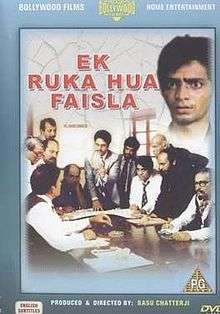Ek Ruka Hua Faisla
| Ek Ruka Hua Faisla | |
|---|---|
 DVD Cover | |
| Directed by | Basu Chatterjee |
| Produced by | Basu Chatterjee |
| Written by | Ranjit Kapur (dialogues) |
| Screenplay by |
|
| Starring | See below |
| Music by | Basu Chakravarti |
| Cinematography | Ajay Prabhakar |
| Edited by | Kamal A. Sehgal |
Release date |
|
Running time | 117 minutes |
| Country | India |
| Language | Hindi |
Ek Ruka Hua Faisla (English: A Pending Decision) is a 1986 Indian Bollywood courtroom drama film, directed by Basu Chatterjee. It is a remake of the Golden Bear winning American motion picture 12 Angry Men (1957), which was directed by Sidney Lumet, the film in turn was an adaptation from a teleplay of the same name by Reginald Rose.[1][2]
Plot
The story begins in a courtroom where a teenage boy from a city slum is on trial for stabbing his father to death. Final closing arguments have been presented, and the judge then instructs the jury to decide whether the boy is guilty of murder, which carries a mandatory death sentence. Once inside the Jury discussion room, it is immediately apparent that all jurors with the sole exception of Juror Number 8 (K.K. Raina) have already decided that the boy is guilty, and that they plan to return their verdict quickly, without taking time for discussion. His vote annoys the other jurors.
The rest of the film centers around the jury's difficulty in reaching a unanimous verdict. While several of the jurors harbor personal prejudices, Juror 8 maintains that the evidence presented in the case is circumstantial, and that the boy deserves a fair deliberation. He calls into question the accuracy and reliability of the only two witnesses to the murder, the rarity of the murder weapon (a common pocketknife, of which he has an identical copy), and the overall questionable circumstances (including the fact that an elevated train was passing by at the time of the murder). He further argues that he cannot in good conscience vote "guilty" when he feels there is reasonable doubt of the boy's guilt and slowly convinces each juror about the same by his logical findings around each piece of evidence.
In the end, the only remaining juror with a guilty vote is Juror 3. A long argument with Juror 8 culminates in 3 revealing that he had had a poor relationship with his own son, and his anger over this fact is the main reason he wants the defendant to be guilty. Juror 3 loses his temper and tears up a photo of himself and his son, then suddenly breaks down crying and changes his vote to "not guilty", making the vote unanimous.
Cast
- Deepak Qazir Kejriwal as Juror No. 1
- Amitabh Srivastav as Juror No. 2
- Pankaj Kapur as Juror No. 3
- S M Zaheer as Juror No. 4
- Subhash Udgata as Juror No. 5
- Hemant Mishra as Juror No. 6
- M. K. Raina as Juror No. 7
- K.K. Raina as Juror No. 8
- Annu Kapoor as Juror No. 9
- Subbiraj as Juror No. 10
- Shailendra Goel as Juror No. 11
- Aziz Qureshi as Juror No. 12
- C. D. Sindhu as Gatekeeper
Crew
- Art Direction: Jaydev Bhattacharya
- Sound: Arun Chakravarty
References
- ↑ Variety film review; 27 February 1957, page 6.
- ↑ Harrison's Reports film review; 2 March 1957, page 35.